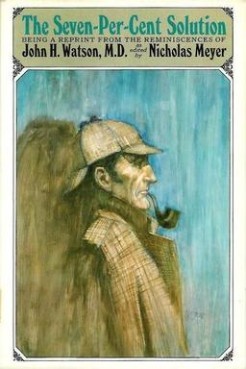As I stated in the preamble to 'The Final Problem', my marriage and my subsequent start in private practice wrought a subtle but definite alternation in the pattern of my friendship with Sherlock Holmes. At first his visits to my new home were regular, and it was not infrequently that I repaid these calls with brief sojourns at my old Baker Street digs, where we star before the fire, smoked a pipe or two, and Holmes caught me up on his latest investigations.
Soon, however, even this arrangement underwent a change; Holmes's visits grew increasingly sporadic and their duration lessened. As my practice increased, it became a matter of greater difficulty to manage my reciprocations.
During winter of '90-'91, I saw him not at all and only learned from the papers that he was in France on a case. Two notes from him– dated Narbonne and Nimes, respectively–were all the information he volunteered upon the subject, and they were terse, showing me that his time was demanded elsewhere.
A wet spring served to increased yet again my little but sturdy practice and it was well into April without a word from Holmes in many months. It was April 24th, in fact, and I was just clearing out the day's debris from my consulting room (not yet being in the position to afford the luxury of a clerk), when into it stepped my friend.
I was astonished to see him–not, I hasten to add, because of the lateness of the hour (for I was used to his odd comings and goings), but because of the change in him. He seemed thinner and paler than usual, which was thin and pale indeed, for he was habitually gaunt and white. His skin had a positively unhealthy pallor and his eyes were without their usual twinkle. Instead they roved restlessly in their sockets, aimlessly taking in their surroundings (it seemed) and yet registering nothing.
"Have you any objection to my closing your shutters?" were almost the first words of his mouth. Before I could answer he edged his way quickly along the wall and, with an abrupt effort, flung closed and securely bolted the shutters. Fortunately there was a lamp burning in the room, and by its light I saw beads of perspiration trickling down his cheeks.
"What is the matter?" I asked.
"Air-guns." He drew out a cigarette and with twitching hands was fumbling in his pockets for a vesta. I had never known him to be so jumpy.
"Here." I lit the cigarette for him. He looked at me keenly for a moment over the wavering flame, no doubt discerning my surprise at his behaviour.
"I must apologise for calling so late." He sucked the smoke in gratefully, his head thrown quickly back. "Is Mrs. Watson in?" he went on before I had time to digest his apology. He was pacing about the small room now, oblivious of my stares.
"She is away on a visit."
"Indeed! You are alone?"
"Quite."
He ceased pacing as abruptly as he had begun, looked a me, and softened his expression in response to mine.
"My dear fellow, I owe you an explanation. I have no doubt you find this all very bizarre."
